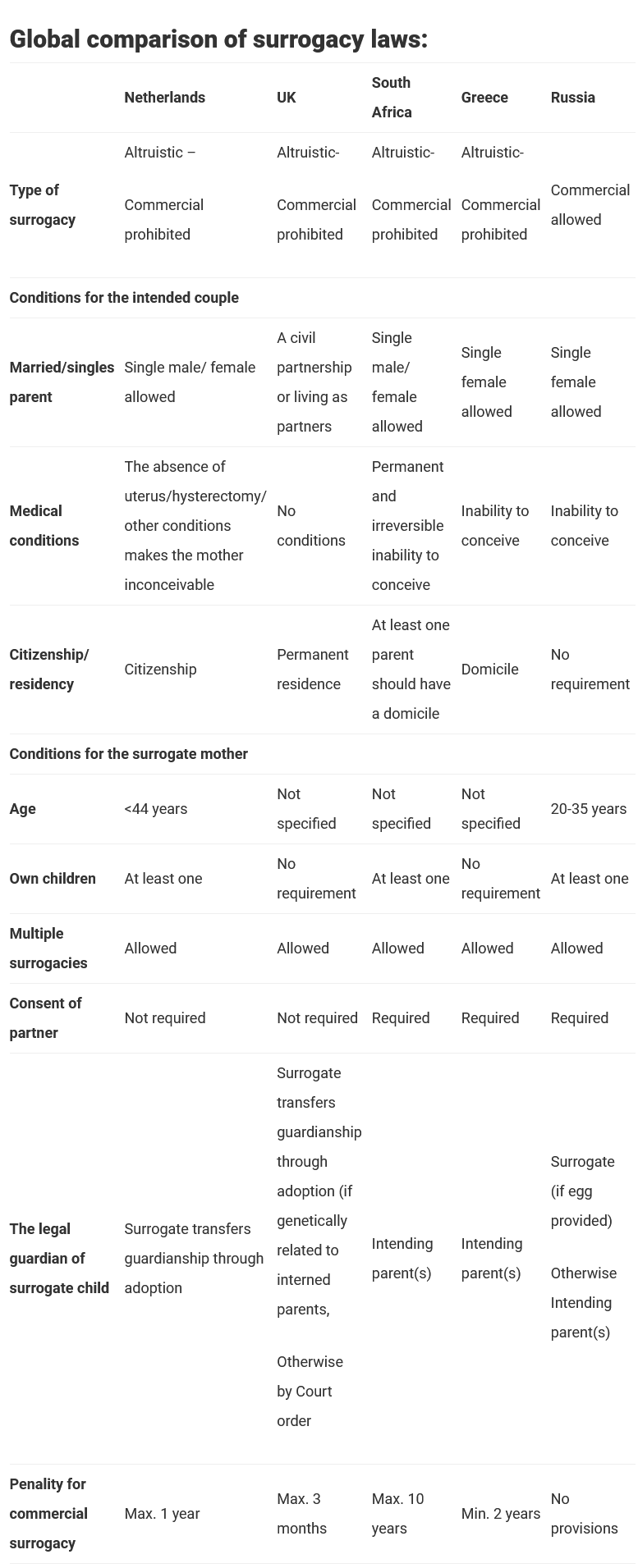 Surrogacy regulation is often in the news, hence it is important to know the surrogacy rules in India and around the world. Read here to know more.
Surrogacy regulation is often in the news, hence it is important to know the surrogacy rules in India and around the world. Read here to know more.
The Surrogacy (Regulation) Bill, 2019 was introduced by the Ministry of Health and Family Welfare, in Lok Sabha on July 15, 2019.
The Union Cabinet has approved the Surrogacy (Regulation) Bill, 2020. The Cabinet incorporated all the recommendations of the Rajya Sabha Select Committee before approving the Bill.
The Bill has been passed in The Rajya Sabha as well and received Presidential consent on December 29th, 2021, hence making it an act.
Also read: Surrogate Advertisement
What is surrogacy?
The act defines surrogacy as a practice where a woman gives birth to a child for an intending couple to hand over the child after the birth to the intending couple.
The Act will constitute the National Assisted Reproductive Technology and Surrogacy Board, State Assisted Reproductive Technology and Surrogacy Boards, and the appointment of appropriate authorities for regulation of the practice and process of surrogacy.
Surrogacy Regulation in India
The Act prohibits commercial surrogacy but allows altruistic surrogacy.
- Altruistic surrogacy involves no monetary compensation to the surrogate mother other than medical expenses and insurance coverage during the pregnancy.
- Commercial surrogacy includes surrogacy or related procedures undertaken for a monetary benefit or reward (in cash or kind) exceeding the basic medical expenses and insurance coverage.
Conditions for permitting surrogacy
- For intending couples who suffer from proven infertility.
- Altruistic
- Not for commercial purposes
- Not for producing children for sale, prostitution, or other forms of exploitation
- For any condition or disease specified through regulations.
Eligibility criteria for intending couple
The intending couple should have a ‘certificate of essentiality’ and a certificate of eligibility issued by the appropriate authority.
A certificate of essentiality is issued if the following conditions are met:
- A certificate of proven infertility of one or both members of the intending couple from a District Medical Board.
- An order of parentage and custody of the surrogate child passed by a Magistrate’s court.
- Insurance coverage for 16 months covering postpartum delivery complications for the surrogate.
A certificate of eligibility is issued on meeting the following conditions:
- The couple should be Indian citizens and married for at least five years.
- Age of wife- 23 to 50 years old and husband- 26 to 55 years old.
- They do not have any surviving child (biological, adopted, or surrogate) – this would not include a child who is mentally or physically challenged or suffers from a life-threatening disorder or fatal illness.
- Other conditions that may be specified by regulations.
Eligibility criteria for surrogate mother
- A close relative of the intending couple
- A married woman having a child of her own
- Age – 25 to 35 years old
- A surrogate only once in her lifetime
- Possess a certificate of medical and psychological fitness for surrogacy.
- The surrogate mother cannot provide her gametes for surrogacy.
Other provisions of the Surrogacy Regulation Act
- National and state surrogacy boards:
- The central and the state governments shall constitute the National Surrogacy Board (NSB) and the State Surrogacy Boards (SSB), respectively.
- Functions of the NSB :
- Advising the central government on policy matters relating to surrogacy
- Laying down the code of conduct of surrogacy clinics
- Supervising the functioning of SSBs.
- Parentage and abortion rules:
- A child born out of a surrogacy procedure will be deemed to be the biological child of the intended couple.
- An abortion of the surrogate child requires the written consent of the surrogate mother and the authorization of the appropriate authority with compliance to the Medical Termination of Pregnancy Act, 1971.
- The surrogate mother will have an option to withdraw from surrogacy before the embryo is implanted in her womb.
- Offenses and penalties:
- Undertaking or advertising commercial surrogacy
- Exploiting the surrogate mother
- abandoning, exploiting, or disowning a surrogate child
- Selling or importing human embryos or gametes for surrogacy.
- The penalty for such offenses is imprisonment up to 10 years and a fine of up to 10 lakh rupees.
Global surrogacy laws

Criticisms of Indian regulations
- The charitable model expects a woman to go through the physical and emotional tolls of surrogacy free of cost and only out of compassion.
- Such an expectation is paternalistic, unrealistic, and patriarchal in its approach.
- It denies a legitimate source of income to surrogates which in turn severely limits the number of women willing to go through surrogacy and indirectly denies intending parents the opportunity to avail of it.
- The proposed Bill continues to deny this opportunity to LGBTQ+ persons, live-in couples, and single parents.
- Those included within its ambit are required to have a ‘certificate of essentiality stating that it is biologically impossible for the person(s) to have a child in any other way.
- It does not consider other medical conditions which even though they do not render women infertile; make the pregnancy riskier and more difficult.
- It also does not consider cases where women might not want to go through pregnancy due to career-related commitments.
More reforms are still needed, and availing surrogacy should be recognized as a reproductive right, till then surrogacy regulation in India will not be able to protect the bodily autonomy of the surrogate and the right to parenthood of the intending parent(s).
Surrogacy Regulation Amendment Rules, 2024
In the exercise of powers conferred under the Surrogacy Regulation Act 2021, the Government has made the following rules to amend the Surrogacy Regulation Rules, 2022.
- Couples (husband or wife), certified by the District Medical Board as suffering from medical conditions, do not require both gametes from the intending couple, provided that the child to be born through surrogacy must have at least one gamete from the intending couple.
- Previously, Rule 7 of Surrogacy Regulation Rules, 2022 prohibited the use of donor gametes.
- Single women (widow or divorcee) undergoing surrogacy must use self-eggs and donor sperms to avail surrogacy procedure.
In 2023, the Supreme Court in the Arun Muthuvel vs. Union of India case allowed a woman with Mayer-Rokitansky-Kuster-Hauser (MRKH) Syndrome to undergo surrogacy with a donor egg. MRKH is a rare congenital disorder that affects the reproductive system and causes infertility.





